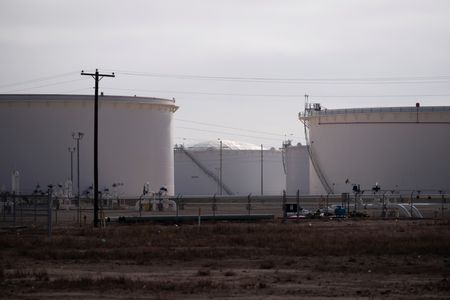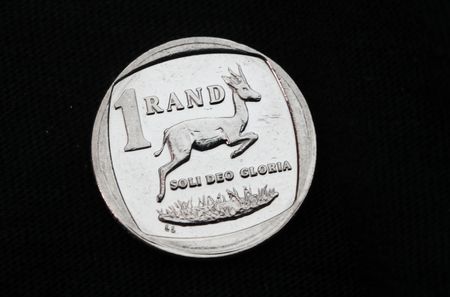By Georgina McCartney
HOUSTON (Reuters) -Oil prices fell on Monday as the latest European sanctions on Russian oil were expected to have minimal impact on supplies, but losses were curbed by investors weighing a potential drop in diesel supplies.
Brent crude futures dropped 19 cents, or 0.3%, to $69.09 a barrel by 1:45 p.m. EDT (1745 GMT), while U.S. West Texas Intermediate crude slipped by 11 cents, or 0.2%, to $67.23.
The European Union approved on Friday the 18th package of sanctions against Russia over its war in Ukraine, which also targeted India’s Nayara Energy, an exporter of oil products refined from Russian crude.
“The market right now thinks that supply will still make it to market in one way, shape or another, there is not too much concern,” said John Kilduff, a partner at Again Capital in New York.
Kremlin spokesperson Dmitry Peskov said on Friday that Russia had built up a certain immunity to Western sanctions.
The EU sanctions followed U.S. President Donald Trump’s threats last week to impose sanctions on buyers of Russian exports unless Russia agrees to a peace deal within 50 days.
ING analysts said the part of the package likely to have an effect is the EU import ban on refined products processed from Russian oil in third countries, though ING said that could prove difficult to monitor and enforce.
Curbing some of crude’s losses during afternoon trade on Monday were investor concerns around diesel supplies resulting from the sanctions package, analysts said.
“As the day has gone on the diesel crack spread started to firm quite a bit, suggesting that the market cannot ignore the fact that any disruptions in Russian oil supply could tighten supplies of diesel and that seems to be giving us a bit of support today,” said Phil Flynn, senior analyst with Price Futures Group.
Low-sulphur gasoil futures were trading at a $26.58 per barrel premium to Brent crude at 1:45 p.m. EDT, up around 4% on the day. If prices hold near that level, it would be the highest close since February 2024.
“We have a bit of room for error on the crude side, barrels can be shuffled around a bit but it is harder to shuffle around tight supplies of diesel,” Flynn added.
Iran, another sanctioned oil producer, is due to hold nuclear talks with Britain, France and Germany in Istanbul on Friday, an Iranian foreign ministry spokesperson said on Monday. That follows warnings by the three European countries that a failure to resume negotiations would lead to international sanctions being reimposed on Iran.
In the United States, the number of operating oil rigs fell by two to 422 last week, the lowest total since September 2021, Baker Hughes said on Friday.
“Oil-focused drilling is expected to remain at subdued levels through the balance of the year,” StoneX analyst Alex Hodes said in a note on Monday.
“We aren’t anywhere close to prices that merit a significant pullback in investment though,” Hodes added.
U.S. tariffs on EU imports are set to kick in on August 1, though U.S. Commerce Secretary Howard Lutnick said on Sunday that he was confident the United States could secure a trade deal with the bloc.
U.S. tariffs are potentially negative for oil demand and economic activity, Again Capital’s Kilduff said.
Some support may come from oil inventory data if it shows tight supply, said IG market analyst Tony Sycamore.
(Reporting by Georgina McCartney in Houston, Anna Hirtenstein in LondonAdditional reporting by Ahmad Ghaddar in London, Florence Tan in Singapore and Sam Li in BeijingEditing by Emelia Sithole-Matarise, Marguerita Choy and Nia Williams)






